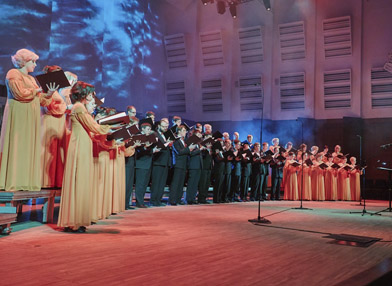Philharmonic opens its 80th season with the presentation of the new colelctive and the execution of Carl Orff’s monumental cantata "Carmina Burana"

On 8th of September Novosibirsk State Philharmonic Society opens its 80th concert season with the performance of Carl Orff's monumental cantata "Carmina Burana". New Philharmonic collective – Novosibirsk Choir Chapel conducted by Igor Yudin comes to the stage of Arnold Kats State Concert Hall in the concert’s opening evening.
On 8th September Carl’s Orff scenic cantata “Carmina Burana” will sound on the concert-opening of Novosibirsk Philharmonic 80th concert season and it will be performed by Novosibirsk Philharmonic Orchestra, Novosibirsk Choir Chapel, Choir of Children's Music School № 2. Soloists are Tatiana Kostina (soprano), Vyacheslav Vorobyev (tenor, Moscow), Pawel Jankowski (baritone). Conductor is Gintaras Rinkevicius, artistic director and chief conductor of Novosibirsk Philharmonic Orchestra.
“Another twenty artists were added to the fifty already being members of the Chamber Choir, and it gave the collective fundamentally new opportunities, - says Igor Yudin, artistic director of the Choir Chapel - I have sought for more than 10 years for the collective’s expansion and status changes, and I thank destiny and the current leadership of the Philharmonic for this finally has come true. We regularly perform large form compositions and the Chamber Choir’s consist was not enough for them, so earlier before we had to invite an additional part of the singers for some programs. But a one-time prompt and systematic cooperation in full force - it is a very big difference, primarily in artistic terms - because the collective needs unity, unified school. For a long time I have heard the objection that collect a large collective for the preparation of a large form compositions in a month is unprofitable. This argument absolutely cannot be applied in the realm of artistic sense. And I am infinitely glad that the management has shown understanding of this fundamental point and followed the creative logic, rather than administrative”.
The cantata was created by Carl Orf in 1935-36 on the basis of his own libretto based on medieval poems from the collection called Carmina Burana. It translates as "Song of Beuern" – on behalf of the Benedictine monastery where the original manuscript collection («Codex Buranus») was found in 1803.
In the basis of the cantata there are 24 poems created by goliards - wandering medieval poets who caroled the earthly joy, praised love, wine and ancient gods, ridiculed sanctimonious church morality. The act named “O Fortuna”, framing the composition, tells about the inexorable goddess of fate. «O, Fortuna, you are changeable - that oppress, that exalt and mind cannot comprehend you." This is the most popular part of the cantata, it often sounds in the movies being subjected to modern adaptations.